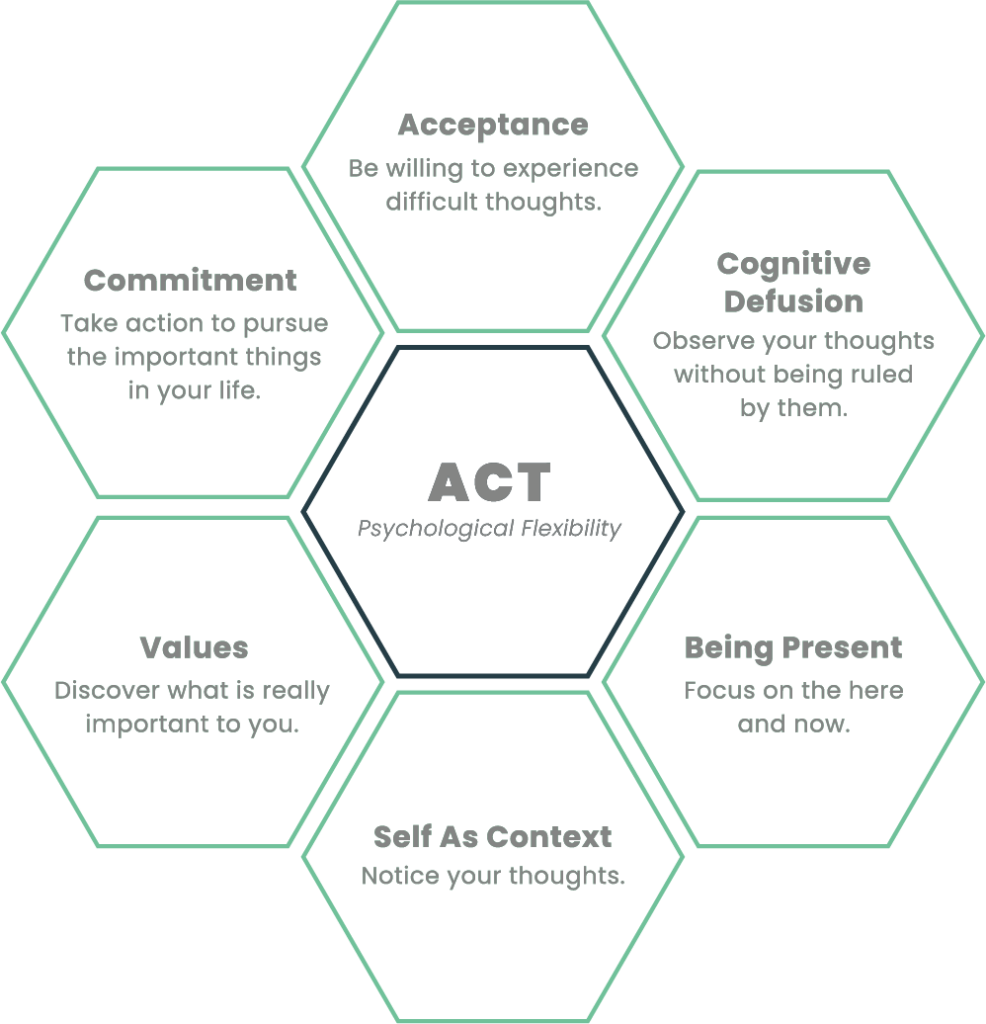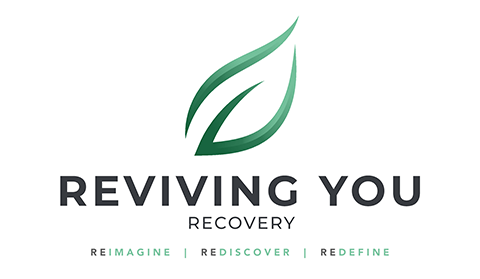
Acceptance & Commitment Therapy
We take great pride in our team of compassionate professionals and the culture of healing and renewal we build.

What is Acceptance & Commitment Therapy?
ACT is a therapeutic approach used in addiction treatment that aims to promote psychological flexibility and improve overall well-being. ACT encourages individuals to accept their thoughts and feelings rather than trying to avoid or suppress them.
Empowering individuals to make meaningful changes
ACT focuses on identifying personal values and committing to actions that align with those values, regardless of any obstacles or distressing emotions that may arise. By cultivating acceptance, mindfulness, and committed action, ACT helps individuals develop the skills to effectively cope with cravings, triggers, and other challenges commonly experienced in addiction recovery. It empowers individuals to break free from self-defeating patterns and make meaningful changes in their lives, ultimately enhancing their chances of long-term sobriety. Whether used in individual or group therapy, ACT provides a valuable framework for addressing addiction and facilitating lasting positive change. It aims to help you move forward through difficult emotions so you can put your energy into healing instead of dwelling on the negative.
With the help of a licensed professional, you’ll pick up a collection of coping mechanisms specifically designed for your situation, which you can use throughout your life to handle challenging experiences.
We understand the critical role that a strong, structured curriculum plays in the successful treatment and healing of individuals struggling with drug and alcohol addiction. Our curriculum is thoughtfully designed to provide a comprehensive and well-rounded approach to recovery, addressing the physical, psychological, and emotional aspects of addiction. By implementing a structured curriculum, we ensure that each client receives consistent and tailored care, as well as a clear roadmap towards their recovery goals. Through a combination of evidence-based therapies, individualized treatment plans, and educational opportunities, our structured curriculum equips our clients with the necessary tools, skills, and knowledge to navigate the challenges of sobriety, rebuild their lives, and achieve lasting success in their recovery journey.
ACT therapy techniques
ACT therapy works by focusing on accepting life experiences as they come, without evaluating or trying to change them. It’s a skill developed through mindfulness exercises that encourage you to build a new and more compassionate relationship with difficult experiences. Doing this can free you from obsessive negative thinking so you can have peace of mind and healing.
Mindfulness plays an important role in ACT therapy. It offers you a way to ground yourself in the present by paying attention moment-by-moment to your feelings, physical sensations, and outside environment. Mindfulness exercises and mindfulness techniques can help support your ACT therapy practice by developing nonjudgmental acceptance of your thoughts and feelings. Instead of trying to change things, rehashing the past, or imagining a future, you remain in the moment.
The beauty of mindfulness is that it can be practiced anytime, anywhere. Research shows ACT to be effective at treating a wide range of conditions, including some that span several diagnoses. ACT can also improve quality of life and may help people deal with physical conditions and chronic pain.


Identifying Values
These are the areas of your life that are important enough to you to motivate action. It is about recognizing what you want to be about and stand for.

Commitment to Action
This process involves changing your behavior based on principles covered in therapy. These specific actions can either move us closer or further toward our values.

Cognitive Defusion Skills
Cognitive defusion is separating yourself from your inner experiences. This allows you to see thoughts simply as thoughts, stripped of the importance that your mind adds to them.

Self as Context or Self as Observer
This involves learning to see your thoughts about yourself as separate from your actions. By doing so, people can make space for their thoughts and feelings without becoming entangled with them. One metaphor asks the client to think of themselves as the sky and their thoughts and feelings as weather patterns. While the weather can shift from clear to stormy, the sky remains the same despite the fleeting nature of the weather. This metaphor conveys that thoughts and feelings are transient, and we don’t equal our thoughts or feelings, nor are we defined by them.

Acceptance
This means allowing your inner thoughts and feelings to occur without trying to change or ignore them. Acceptance is an active process. Specific skills that are used in ACT therapy to help clients learn acceptance include self-compassion meditations, emotion exposure, physicalizing emotions or thoughts, loving-kindness phrases, and experiential exercises and metaphors.

Present Moment Contact
ACT therapy encourages you to stay mindful of your surroundings and learn to shift your attention away from internal thoughts and feelings. This involves a conscious and deliberate effort to focus on the world around you in the moment. Staying engaged with the present can help you build greater awareness and prevent past experiences, memories, and conditioning from negatively affecting your interactions in the here and now.
An approach helping individuals struggling with mental health conditions
ACT focuses on teaching individuals to accept their thoughts and emotions, rather than trying to suppress or control them. By accepting their experiences, individuals can then make a commitment to taking actions that align with their values and lead to a more fulfilling life.
During ACT, our team will help you apply these concepts to your life. Individuals develop the skills to effectively cope with cravings, triggers, and other challenges commonly experienced in addiction recovery.
- Stress Regulation
- Work Stress
- Anxiety
- Depression
- PTSD
- Substance Abuse
- Phobias
- Chronic Pain
- Eating Disorders
- Obsessive-Compulsive Behavior
Your future starts here
Redimagine. Rediscover. Redefine.
Embrace the strength and resilience within you, and trust that by taking the first step to help yourself, you are not only opening the door to a brighter, healthier future but also unlocking your true potential.

I enjoyed the groups, and the staff always cared for anything I had to say. AA groups were my favorite because I found fellowship. Thank you to all the staff, you guys helped when I needed it most.
— PM









